Event to explore bioethics and medical practice Sept. 28-30
Patient care. Informed consent. Genetics and transplantation.
Mary Shelley’s “Frankenstein” is a thrilling adventure but also a prescient guidebook to the moral and ethical dilemmas of 20th and 21st century medicine.
This month, Washington University in St. Louis’ School of Medicine and College of Arts & Sciences will present “The Curren(t)cy of Frankenstein,” a three-day forum that explores Shelley’s novel through the lens of medical research, education and practice.
“Victor Frankenstein succeeds in conquering death,” said Rebecca Messbarger, professor of Italian and co-founder of the Program in Medical Humanities, both in Arts & Sciences. “He creates an extra-human being, one that is stronger, faster, more agile, and whose parts are in themselves more beautiful and proportional than any natural man’s.
“Yet Frankenstein never contemplates the possible consequences of the composite being he brings to life,” Messbarger continued. “He never truly considers the human impact of his experiments. To know more, to be the first, to surpass all before him in this achievement and revel in the glory — these are what drive him.
“By the novel’s end, Frankenstein has been destroyed by the terrible consequences of his ambition,” Messbarger added. “His grief at the loss of his own soul is a parable for the modern age about the destructive force of science divorced from humanity.
“As romantics like Mary Shelley warned, there is no triumph in it,” Messbarger concluded. “Humanity must be at the center of science.”
‘The Curren(t)cy of Frankenstein’
“The Curren(t)cy of Frankenstein” is presented as part of Washington University’s ongoing Frankenstein Bicentennial, which celebrates the 200th anniversary of the novel’s publication.
The forum will begin Friday, Sept. 28, with celebrated science writer Luke Dittrich, who will discuss “Shelley’s Frankenstein and modern medical practice: A family story of lobotomy.” (While in St. Louis, Dittrich also will discuss his book, “Patient H.M.: A story of memory, madness and family secrets,” for the university’s Assembly Series.)
The forum will continue Saturday, Sept. 29, with William Newman, historian of science at Indiana University, who will explore “Frankenstein, the homunculus, and the long history of artificial life.” On Sunday, Sept. 30, Amy Pawl, senior lecturer in English in Arts & Sciences, will argue that “We must save Frankenstein’s monster,” while Minsoo Kang, historian at the University of Missouri-St. Louis, will make the case that “We must kill Frankenstein.”
